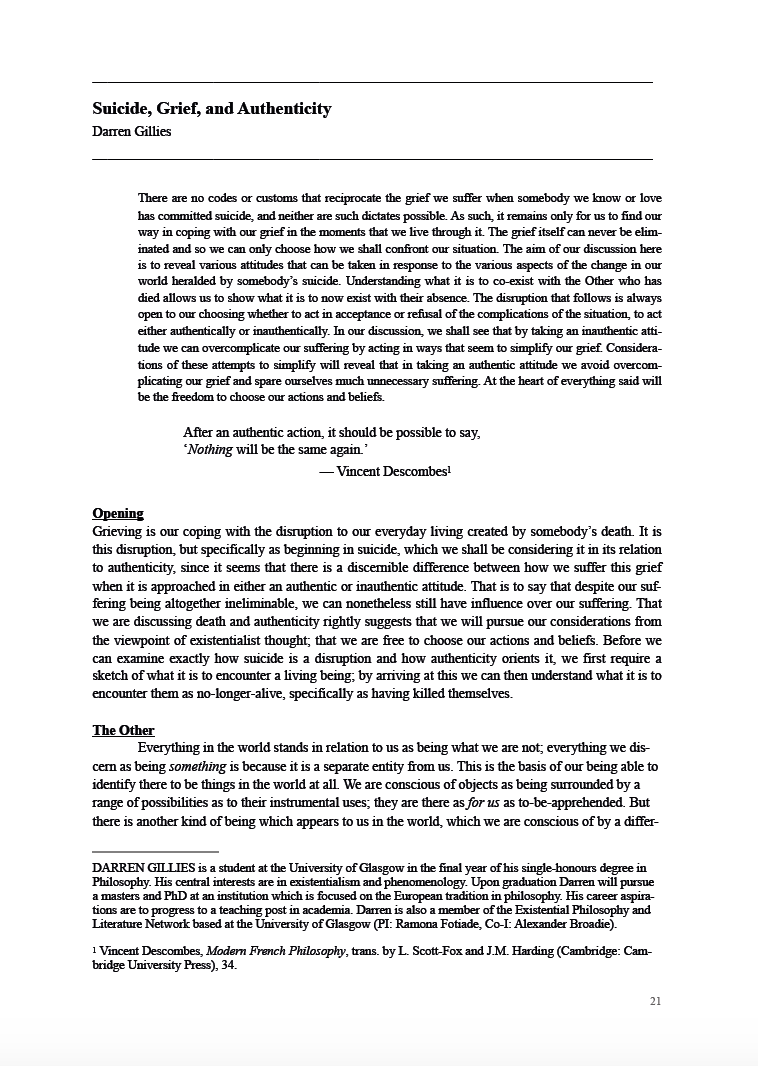Suicide, Grief, and Authenticity
DOI:
https://doi.org/10.36399/GroundingsUG.11.172Keywords:
Suicide, Grief, Authenticity, Descombes, Heidegger, Other, Distance, Absence, SynthesisAbstract
There are no codes or customs that reciprocate the grief we suffer when somebody we know or love has committed suicide, and neither are such dictates possible. As such, it remains only for us to find our way in coping with our grief in the moments that we live through it. The grief itself can never be eliminated and so we can only choose how we shall confront our situation. The aim of our discussion here is to reveal various attitudes that can be taken in response to the various aspects of the change in our world heralded by somebody’s suicide. Understanding what it is to co-exist with the Other who has died allows us to show what it is to now exist with their absence. The disruption that follows is always open to our choosing whether to act in acceptance or refusal of the complications of the situation, to act either authentically or inauthentically. In our discussion, we shall see that by taking an inauthentic attitude we can overcomplicate our suffering by acting in ways that seem to simplify our grief. Considerations of these attempts to simplify will reveal that in taking an authentic attitude we avoid overcomplicating our grief and spare ourselves much unnecessary suffering. At the heart of everything said will be the freedom to choose our actions and beliefs.
References
Descombes, Vincent. Modern French Philosophy. Translated by L. Scott-Fox and J.M. Harding. Cambridge: Cambridge University Press, 1980.
Ioannidis, Iraklis. “Broaching the Difference Between Intersubjectivity and Intersubjection Inspired by the Feminist Critique.” Sofia Philosophical Review 10, no. 2 (2017): 38–68.
Heidegger, Martin. Being and Time. Translated by John Macquarrie. Oxford: Blackwell Publishing, 1962.
Houlgate, Stephen. An Introduction to Hegel: Freedom, Truth and History. London: Routledge, 2004.
Sartre, Jean-Paul. Being and Nothingness. Translated by Hazel Barnes. London: Routledge, 2003.
Schacht, Richard. Hegel and After: Studies in Continental Philosophy between Kant and Sartre. Pittsburgh: University of Pittsburgh Press, 1975.
“William of Ockham,” Stanford Encyclopedia of Philosophy. Last modified 2015. https://plato.stan-ford.edu/entries/ockham/#4.1.

Downloads
Published
Issue
Section
License
Copyright (c) 2018 Darren Gillies

This work is licensed under a Creative Commons Attribution 4.0 International License.
The CC BY 4.0 license is a Creative Commons license. This is a non-copyleft free license that is good for art and entertainment works, and educational works. It is compatible with all versions of the GNU GPL; however, like all CC licenses, it should not be used on software. People are free to: Share — copy and redistribute the material in any medium or format; Adapt — remix, transform, and build upon the material for any purpose, even commercially. The licensor cannot revoke these freedoms as long as you follow the license terms. But they must conform to the following terms: Attribution — You must give appropriate credit, provide a link to the license, and indicate if changes were made. You may do so in any reasonable manner, but not in any way that suggests the licensor endorses you or your use. No additional restrictions — You may not apply legal terms or technological measures that legally restrict others from doing anything the license permits.
Please check individual article PDF copies to see if any additional restrictions apply.







